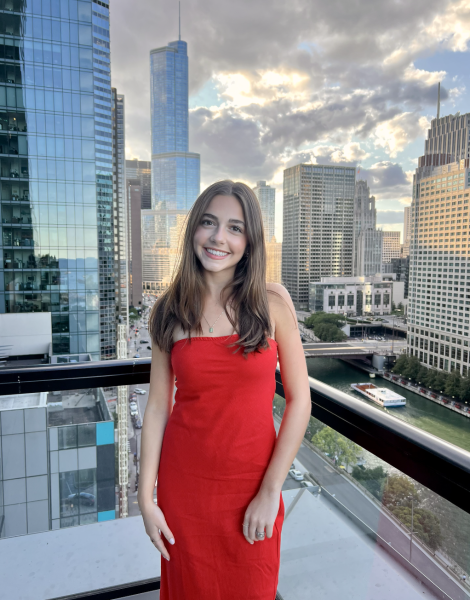Chicago politicians address many crucial issues involving crime, housing, business, and Chicago’s future every day. Second Ward Alderman Brian Hopkins, one of the city’s key political figures, shared his insights in an interview with The Forum on how local government decisions shape the community’s future.
“My favorite part about my job is the ability to solve a problem, to see a process through from the early stages where you identify a problem,” Alderman Hopkins said. “Then you work to find the solution that makes the most sense and solve the problem. I make a positive difference in people’s lives.”
Alderman Hopkins noted that unpredictable issues, such as civilian safety, add complexity to his position. “Consider the unlikeliness of where we are today as a society and the unpredictability of it all,” he said. “No one saw COVID coming. There are so many other forces that have shaped where we are in society today that even the bright minds among us had no idea this would happen.”
Commenting on civilian safety and concerns about crime, he said, “The science of law enforcement has advanced the understanding of human behavior, using technology to solve crimes, to identify defenders, using things like cameras and predictive analytic software that can monitor the video feeds and make predictions based on what it’s seeing.”
Alderman Hopkins discussed new software originally designed for cattle ranchers to analyze the movement patterns of their herds. “The software can detect unusual behavior patterns or criminal acts that are happening and trigger an alert,” he said. “The police can respond immediately, freeing resources to focus on other tasks and only responding when necessary.” The technology has the potential to aid in crime prevention.
However, this technological advancement has sparked privacy concerns, and the city is debating approving this software. The National Association for the Advancement of Colored People (NAACP) demands that state legislators evaluate artificial intelligence before accepting new software due to potential underlying racial bias. The software may result in disproportionate surveillance in Black communities.
As the debate over privacy concerns continues, Alderman Hopkins focuses on the safety and economic recovery of downtown Chicago, the city’s main tourist attraction. “If people don’t feel safe, they won’t choose to go to the area,” he said. Unlike some downtown neighborhoods in other cities across the United States, Chicago has struggled to recover as strongly after the pandemic. Retail vacancies in Chicago’s Loop have skyrocketed to 30%.
One solution might be converting vacant office spaces into residential buildings. The process of collecting the money to transform the vacant space is placed largely on taxpayers. A downtown revitalization plan proposed recently by Chicago Mayor Brandon Johnson calls for a cash injection of $528 million, and would require $150 million of Tax Increment Financing (TIF) assistance. The city’s financial investment in revitalizing the downtown area aims to prevent the Loop from becoming abandoned. However, some taxpayers and economic experts have raised concerns about the high cost and the potential tax increase, and have questioned the plan’s viability.
Despite concerns about crime, the upcoming Democratic National Convention (DNC) will be hosted in Chicago.
Local activists plan to organize protests during the upcoming convention to voice their demands directly to President Biden and delegates. Alderman Hopkins said, “We are working closely with the Secret Service, the Chicago police, and private security companies specializing in crowd control and management. We recently bought a new $11 million helicopter. The DNC gave us the money to buy it. That will be used as a command center in the sky.”
As Chicago prepares for the DNC, it is crucial to consider the city’s future leaders. Students from the Latin School of Chicago may one day organize similar significant events. As a piece of advice, Alderman Hopkins said, “Just be yourselves; take advantage of all of the things you’ve been given and all the things that led to you being a Latin student in the first place. The true leaders of society will be the ones that can inspire a new sense of collectivism where we are all in it together, and that’s one of the greatest challenges facing the upcoming generation.”
For students interested in politics, Chicago offers a variety of internship opportunities to advance and utilize such interests. Many aldermen hire interns throughout the summer to help them with work and provide hands-on experiences in politics.
Freshman Kavina Aggarwal said, “I’m interested in having an internship in the future to explore my interests.” There are various internship programs throughout Chicago for teenagers to advance their knowledge in topics of their choice.
Alderman Hopkins said, “There’s a lot of programs for juniors and seniors. The Mikva program is really good.” He highlighted the wide variety of councils, internships, and programs that offer opportunities to develop leadership and research skills while learning about Chicago’s government.
He continued, “Never lose sight of the fact that your education, your background, and everything you’ve learned automatically makes you a leader of society. You’re a leader of this society today; with all of its troubles, this new generation coming up is going to be the ones to fix it for us all or not.”

















































